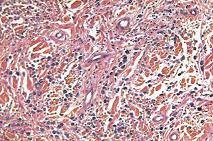Advertisment
The factor that could influence future breast cancer treatment

Researchers have shown in the laboratory how a ‘transcription factor’ causes breast cancer cells to develop an aggressive subtype that lacks sensitivity to oestrogen and does not respond to known anti-oestrogen therapies. In this case, the transcription factor known as ‘ELF5’ inhibits sensitivity to oestrogen very early in the life of a breast cancer cell. In 2008, Professor Chris Ormandy from the Garvan Institute of Medical Research in Sydney, Australia, showed that ELF5 was responsible for the development of breast progenitor cells into the oestrogen-receptor-negative cells that produce milk in the breast during pregnancy.
In the current study, a team led by Ormandy in collaboration with Drs Maria Kalyga and David Gallego-Ortega, has shown that the same molecular decision occurs in breast cancer and that ELF5 has the ability to change an existing tumour into an oestrogen-insensitive tumour.
“This work tells us that cancers which become refractory to anti-oestrogen treatment often do so by elevating their levels of ELF5 and becoming functionally oestrogen receptor negative,” said Ormandy.
The team has also described the genetic mechanisms by which ELF5 opposes the action of estrogen, and has shown that it is possible to alter the subtype of breast cancer by manipulating ELF5 levels in cancer cells in the laboratory.
“This raises the therapeutic option of manipulating ELF5 levels to treat breast cancer. As ELF5 is intracellular, this could possibly be done with small molecule therapies that penetrate cells and target protein-to-protein interactions, or with small inhibitory RNAs. There is also the possibility of testing ELF5 levels in tumours to predict response to treatment and therefore guide treatment decisions.”
“Our key discovery here is that by simply manipulating one transcription factor we can change the subtype of breast cancer.”
Disclosure Funding: This work was funded by The National Health and Medical Research Council of Australia, New South Wales Cancer Council, Cancer Institute New South Wales, Banque Nationale de Paris-Paribas Australia and New Zealand, RT Hall Trust, Australian Cancer Research Foundation, Prostate Cancer Foundation Australia, Cure Cancer Foundation Australia, Breast Cancer Campaign UK, and the National Breast Cancer Foundation. The funders had no role in study design, data collection and analysis, decision to publish, or preparation of the manuscript.
Citation: Kalyuga M, Gallego-Ortega D, Lee HJ, Roden DL, Cowley MJ, et al. (2012) ELF5 Suppresses Estrogen Sensitivity and Underpins the Acquisition of Antiestrogen Resistance in Luminal Breast Cancer. PLoS Biol 10(12): e1001461. doi:10.1371/journal.pbio.1001461
For further information: Christopher Ormandy c.ormandy@garvan.org.au





